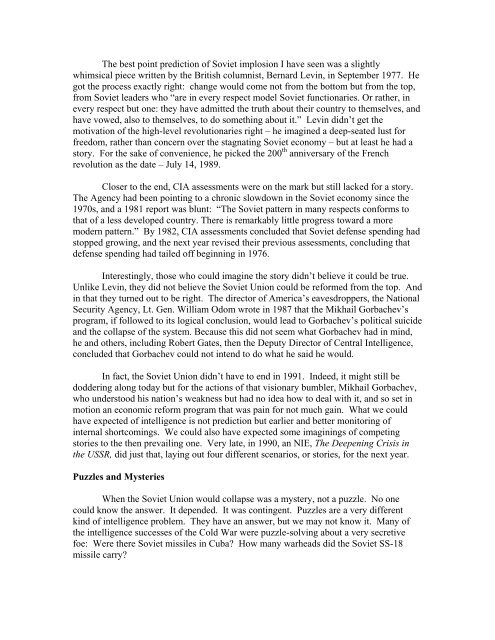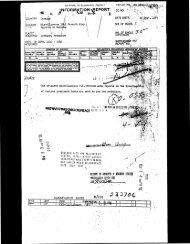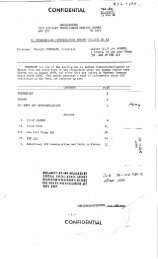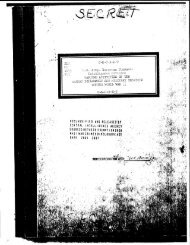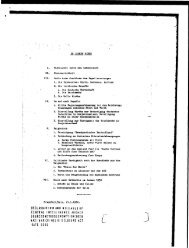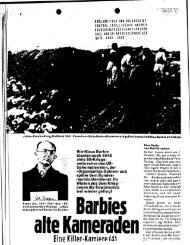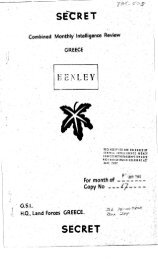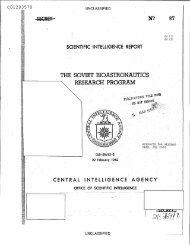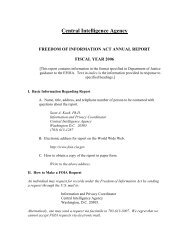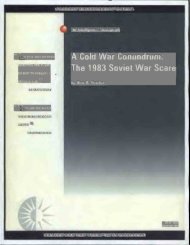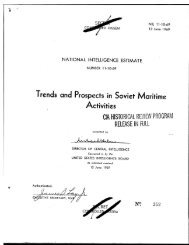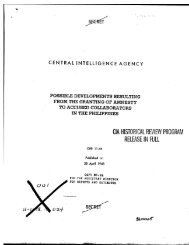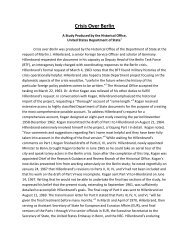2011-05-25 What Should We Expect of Intelligence - CIA FOIA
2011-05-25 What Should We Expect of Intelligence - CIA FOIA
2011-05-25 What Should We Expect of Intelligence - CIA FOIA
Create successful ePaper yourself
Turn your PDF publications into a flip-book with our unique Google optimized e-Paper software.
The best point prediction <strong>of</strong> Soviet implosion I have seen was a slightly<br />
whimsical piece written by the British columnist, Bernard Levin, in September 1977. He<br />
got the process exactly right: change would come not from the bottom but from the top,<br />
from Soviet leaders who “are in every respect model Soviet functionaries. Or rather, in<br />
every respect but one: they have admitted the truth about their country to themselves, and<br />
have vowed, also to themselves, to do something about it.” Levin didn’t get the<br />
motivation <strong>of</strong> the high-level revolutionaries right – he imagined a deep-seated lust for<br />
freedom, rather than concern over the stagnating Soviet economy – but at least he had a<br />
story. For the sake <strong>of</strong> convenience, he picked the 200 th anniversary <strong>of</strong> the French<br />
revolution as the date – July 14, 1989.<br />
Closer to the end, <strong>CIA</strong> assessments were on the mark but still lacked for a story.<br />
The Agency had been pointing to a chronic slowdown in the Soviet economy since the<br />
1970s, and a 1981 report was blunt: “The Soviet pattern in many respects conforms to<br />
that <strong>of</strong> a less developed country. There is remarkably little progress toward a more<br />
modern pattern.” By 1982, <strong>CIA</strong> assessments concluded that Soviet defense spending had<br />
stopped growing, and the next year revised their previous assessments, concluding that<br />
defense spending had tailed <strong>of</strong>f beginning in 1976.<br />
Interestingly, those who could imagine the story didn’t believe it could be true.<br />
Unlike Levin, they did not believe the Soviet Union could be reformed from the top. And<br />
in that they turned out to be right. The director <strong>of</strong> America’s eavesdroppers, the National<br />
Security Agency, Lt. Gen. William Odom wrote in 1987 that the Mikhail Gorbachev’s<br />
program, if followed to its logical conclusion, would lead to Gorbachev’s political suicide<br />
and the collapse <strong>of</strong> the system. Because this did not seem what Gorbachev had in mind,<br />
he and others, including Robert Gates, then the Deputy Director <strong>of</strong> Central <strong>Intelligence</strong>,<br />
concluded that Gorbachev could not intend to do what he said he would.<br />
In fact, the Soviet Union didn’t have to end in 1991. Indeed, it might still be<br />
doddering along today but for the actions <strong>of</strong> that visionary bumbler, Mikhail Gorbachev,<br />
who understood his nation’s weakness but had no idea how to deal with it, and so set in<br />
motion an economic reform program that was pain for not much gain. <strong>What</strong> we could<br />
have expected <strong>of</strong> intelligence is not prediction but earlier and better monitoring <strong>of</strong><br />
internal shortcomings. <strong>We</strong> could also have expected some imaginings <strong>of</strong> competing<br />
stories to the then prevailing one. Very late, in 1990, an NIE, The Deepening Crisis in<br />
the USSR, did just that, laying out four different scenarios, or stories, for the next year.<br />
Puzzles and Mysteries<br />
When the Soviet Union would collapse was a mystery, not a puzzle. No one<br />
could know the answer. It depended. It was contingent. Puzzles are a very different<br />
kind <strong>of</strong> intelligence problem. They have an answer, but we may not know it. Many <strong>of</strong><br />
the intelligence successes <strong>of</strong> the Cold War were puzzle-solving about a very secretive<br />
foe: <strong>We</strong>re there Soviet missiles in Cuba? How many warheads did the Soviet SS-18<br />
missile carry?


